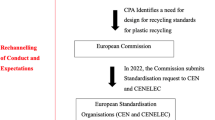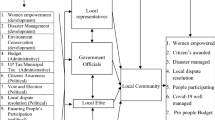Abstract
Multi-stakeholder initiatives (MSI) claim to make production of commodities more socially and environmentally sustainable by regulating their members and through systems of certification. These claims, however, are highly contested. In this article, I examine how actors use MSI regulation with regard to land conflicts with a focus on the Roundtable on Sustainable Palm Oil (RSPO). MSIs are a resource that actors in land conflicts can use to generate evidence that gives them leverage in their negotiations. To do so, actors employ the interrelations between two kinds of land conflict: localized land conflicts between local land users, and disputes between more distant actors over aggregated land-use related to the sustainability of palm oil production. To demonstrate this, I use the notion of assemblage in two case studies from Sumatra, Indonesia. Thinking in terms of assemblage allows the contradictory but interrelated practices that shape MSIs to be understood. In distinct locally embedded processes, actors enact MSIs in contexts of unequal power relations, from which MSI governance emerges. The way in which access to an MSI is distributed among contending actors shapes MSI enactments and thus its governance. The unequal distribution of access to the RSPO results in a governance that favors companies over communities.
Similar content being viewed by others
Abbreviations
- MSI:
-
Multi-stakeholder initiative
- NGO:
-
Non-governmental organization
- RSPO:
-
Roundtable on Sustainable Palm Oil
References
Allen, J. 2011. Powerful assemblages? Area 43(2): 154–157.
Atep. 2012. Sinergi sawit dan pelestarian hutan. Infosawit News Week 1(2): 4.
Belcher, B., N.I. Rujehan, and R. Achdiawan. 2004. Rattan, rubber, or oil palm: Cultural and financial considerations for farmers in Kalimantan. Economic Botany 58(Suppl.): 77–87.
Bush, S. 2010. Governing ‘spaces of interaction’ for sustainable fisheries. Tijdschrift voor Economische en Sociale Geografie 101(3): 305–319.
Chao, S. 2012. Free, prior and informed consent and oil palm expansion in Southeast Asia—from principles to practice. South East Asia Consultation on Landgrabbing and Palm Oil Plantations: Civil Society Response in South East Asia. Report by Forest Peoples Programme.
Chao, S., A.K.L. Raja, F.A. Chalifah, and R. Kusumohartono. 2012. A study on the right to free, prior and informed consent in PT Mustika Sembuluh, Central Kalimantan, Indonesia. Report by Forest Peoples Programme, Walhi and Sawit Watch.
Cheyns, E. 2011. Multi-stakeholder initiatives for sustainable agriculture: The limits of the ‘inclusivenes’ paradigm. In Governing through standards: Origins, drivers and limits, ed. S. Ponte, P. Gibbon, and J. Vestergaard, 210–235. London: Palgrave.
Colchester, M., W.A. Pang, W.M. Chuo, and T. Jalong. 2007a. Land is life: Land rights and oil palm development in Sarawak. Report by Sawit Watch, Forest Peoples Programme.
Colchester, M., N. Jiwan, Andiko, M. Sirait, A.Y. Firdaus, A. Surambo, and H. Pane. Forest Peoples Programme. 2007b. Promised land: Palm oil and land acquisition in Indonesia: Implications for local communities and indigenous peoples. Report by Forest Peoples Programme and Perkumpulan Sawit Watch.
Colchester, M., and S. Chao. 2011. Oil palm expansion in south East Asia: Trends and implications for local communities and indigenous peoples. Report by Forest Peoples Programme.
Colchester, M., S. Chao and N. Jiwan 2012a. Securing rights through commodity roundtables? A comparative review. Report by Forest Peoples Programme.
Colchester, M., T. Jalong and W.M. Chuo 2012b. Free, prior and informed consent in the palm oil sector—Sarawak: IOI-Pelita and the community of Long Teran Kanan. Report by Forest Peoples Programme.
Danielsen, F., H. Beukema, N.D. Burgess, F. Parish, C.A. Brühl, P.F. Donald, D. Murdiyarso, B. Phalan, L. Reijnders, M. Struebig, and E.B. Fitzherbert. 2009. Biofuel plantations on forested lands: Double jeopardy for biodiversity and climate. Conservation Biology 23(2): 348–358.
Eden, S. 2008. Being fieldworthy: Environmental knowledge practices and the space of the field in forest certification. Environment and Planning D: Society and Space 26(6): 1018–1035.
Feintrenie, L., and P. Levang. 2009. Sumatra’s rubber agroforests: Advent, rise and fall of a sustainable cropping system. Small-scale Forestry 8(3): 323–335.
Fitzherbert, E.B., M.J. Struebig, A. Morel, F. Danielsen, C.A. Brühl, P.F. Donald, and B. Phalan. 2008. How will oil palm expansion affect biodiversity? Trends in Ecology & Evolution 23(10): 538–545.
Foley, P. 2012. The political economy of Marine Stewardship Council certification: Processors and access in Newfoundland and Labrador’s inshore shrimp industry. Journal of Agrarian Change 12(2–3): 436–457.
Fransen, L.W., and A. Kolk. 2007. Global rule-setting for business: A critical analysis of multi-stakeholder standards. Organization 14(5): 667–684.
German, L., and G. Schoneveld. 2012. A review of social sustainability considerations among EU-approved voluntary schemes for biofuels, with implications for rural livelihoods. Energy Policy 51: 765–778.
Getz, C., and A. Shreck. 2006. What organic and fair trade labels do not tell us: Towards a place-based understanding of certification. International Journal of Consumer Studies 30(5): 490–501.
Gibbs, H.K., A.S. Ruesch, F. Achard, M.K. Clayton, P. Holmgren, N. Ramankutty, and J.A. Foley. 2010. Tropical forests were the primary sources of new agricultural land in the 1980s and 1990s. Proceedings of the National Academy of Sciences of the United States of America 107(38): 16732–16737.
Gillespie, P. 2012. The challenges of corporate governance in Indonesian oil palm: Opportunities to move beyond legalism? Asian Studies Review 36(2): 247–269.
Goetz, A. 2013. Private governance and land grabbing: The Equator principles and the Roundtable on Sustainable Biofuels. Globalizations 10(1): 199–204.
Gorur, R. 2011. Policy as assemblage. European Educational Research Journal 10(4): 611–622.
Hall, D. 2011. Land grabs, land control, and Southeast Asian crop booms. The Journal of Peasant Studies 38(4): 837–857.
Johnson, A. 2012. Green governance or green grab? The biopolitics of the Roundtable on Sustainable Palm Oil (RSPO) and its processes in Ecuador. In International conference on global land grabbing II, Department of Development Sociology at Cornell University, Ithaca, NY.
Kefasi, N., F. Oluwole, A. Adewale, and O. Gbadebo. 2011. Promoting effective multi-stakeholder partnership for policy development for smallholder farming systems: A case of the sub Saharan Africa challenge programme. African Journal of Agricultural Research 6(15): 3451–3455.
Konefal, J., and M. Hatanaka. 2011. Enacting third-party certification: A case study of science and politics in organic shrimp certification. Journal of Rural Studies 27(2): 125–133.
Koyama, J.P., and H. Varenne. 2012. Assembling and dissembling: Policy as productive play. Educational Researcher 41(5): 157–162.
Li, T.M. 2007. Practices of assemblage and community forest management. Economy and Society 36(2): 263–293.
Lomax, T. 2012. Human rights-based analysis of the agricultural concession agreements between Sime Darby and Golden Veroleum and the government of Liberia. Report by Forest Peoples Programme.
McCarthy, J.F. 2010. Processes of inclusion and adverse incorporation: Oil palm and agrarian change in Sumatra. Indonesia. Journal of Peasant Studies 37(4): 821–850.
McFarlane, C. 2009. Translocal assemblages: Space, power and social movements. Geoforum 40(4): 561–567.
McFarlane, C. 2011. Assemblage and critical urbanism. City 15(2): 204–224.
Mena, S., and G. Palazzo. 2010. Input and output legitimacies in multi-stakeholder initiatives. Academy of management 2010 annual meeting—dare to care: Passion and compassion in management practice and research, Montreal, QC.
Méndez, V.E., C.M. Bacon, M. Olson, S. Petchers, D. Herrador, C. Carranza, L. Trujillo, C. Guadarrama-Zugasti, A. Cordón, and A. Mendoza. 2010. Effects of fair trade and organic certifications on small-scale coffee farmer households in Central America and Mexico. Renewable Agriculture and Food Systems 25(03): 236–251.
Ngidang, D. 2002. Contradictions in land development schemes: The case of joint ventures in Sarawak. Malaysia. Asia Pacific Viewpoint 43(2): 157–180.
Obidzinski, K., R. Andriani, H. Komarudin, and A. Andrianto. 2012. Environmental and social impacts of oil palm plantations and their implications for biofuel production in Indonesia. Ecology and Society 17(1): 481–499.
Ong, A., and S.J. Collier. 2005. Global assemblages, anthropological problems. In Global assemblages, ed. A. Ong, and S.J. Collier, 3–21. Malden: Blackwell.
Pattberg, P. 2005. What role for private rule-making in global environmental governance? Analysing the Forest Stewardship Council (FSC). International Environmental Agreements: Politics, Law and Economics 5(2): 175–189.
Ponte, S. 2012. The Marine Stewardship Council (MSC) and the making of a market for ‘sustainable fish’. Journal of Agrarian Change 12(2–3): 300–315.
Ponte, S., and E. Cheyns. 2013. Voluntary standards, expert knowledge and the governance of sustainability networks. Global Networks 459–477.
Raynolds, L., D. Murray, and A. Heller. 2007. Regulating sustainability in the coffee sector: A comparative analysis of third-party environmental and social certification initiatives. Agriculture and Human Values 24(2): 147–163.
Ribot, J.C., and N.L. Peluso. 2003. A theory of access. Rural sociology 68(2): 153–181.
Rist, L., L. Feintrenie, and P. Levang. 2010. The livelihood impacts of oil palm: Smallholders in Indonesia. Biodiversity and Conservation 19(4): 1009–1024.
Schouten, G., and P. Glasbergen. 2011. Creating legitimacy in global private governance: The case of the Roundtable on Sustainable Palm Oil. Ecological Economics 70(11): 1891–1899.
Selfa, T., C. Bain, and R. Moreno. (this issue). Depoliticizing land and water “grabs” in Colombia: the limits of Bonsucro certification for enhancing sustainable biofuel practices. Agriculture and Human Values.
Silva-Castañeda, L. 2012. A forest of evidence: Third-party certification and multiple forms of proof—A case study of oil palm plantations in Indonesia. Agriculture and Human Values 1–10.
Sirait, M.T. 2009. Indigenous peoples and oil palm plantation expansion in West Kalimantan, Indonesia. Report by Amsterdam University Law Faculty: May.
Solomon, B.D., R. Bailis, C. Moser, and T. Hildebrandt. 2014. International sustainability standards and certification. In Sustainable development of biofuels in Latin America and the Caribbean, ed. B.D. Solomon, and R. Bailis, 27–69. New York: Springer.
Wiersum, K.F., S. Humphries, and S. van Bommel. 2011. Certification of community forestry enterprises: Experiences with incorporating community forestry in a global system for forest governance. Small-scale Forestry 1–17.
WWF. 2013. WWF assessment of RSPO member palm oil producers.
Acknowledgments
I would like to thank Emmanuelle Cheyns, Ernestine Köhne-Hoegen, Florence Palpacuer, Elisabet Rasch, Lone Riisgaard, Dik Roth and Theresa Selfa and for their valuable comments. An earlier version of this paper was presented at the international workshop on Governing Sustainable Agriculture through Multi-Stakeholder Initiatives: Participation, knowledge and networks in action at Cirad, Montpellier, December 2012. Joy Burrough advised on the English of a near-final draft.
Author information
Authors and Affiliations
Corresponding author
Rights and permissions
About this article
Cite this article
Köhne, M. Multi-stakeholder initiative governance as assemblage: Roundtable on Sustainable Palm Oil as a political resource in land conflicts related to oil palm plantations. Agric Hum Values 31, 469–480 (2014). https://doi.org/10.1007/s10460-014-9507-5
Accepted:
Published:
Issue Date:
DOI: https://doi.org/10.1007/s10460-014-9507-5




